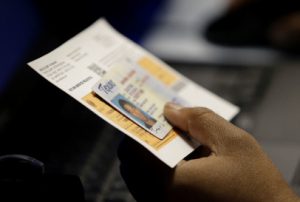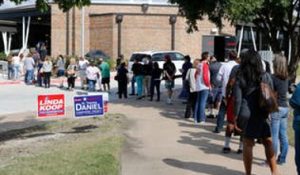

A panel from the Fifth Circuit Court of Appeals in New Orleans, in a split decision, stayed the district court’s granting a permanent injunction against enforcement of certain sections of the Texas Voter ID law. Those protesting the law, claimed it was unconstitutional because it would prevent, or at least deter, voters without a “valid form of ID” from voting. The Fifth Circuit, in a surprising turn, not only applied the law to the issue before it but they also applied common sense.
In its opinion, the court stated, “The State has made a strong showing that it is likely to succeed on the merits. SB 5 allows voters without qualifying photo ID to cast regular ballots by executing a declaration that they face a reasonable impediment to obtaining qualifying photo ID.” If you check the Texas Secretary of State’s website, you can see there are a number of ways a voter can identify himself and still be in compliance with the law. Among the accepted forms of identification are a valid driver’s license, an election identification certificate, a state ID card, a concealed carry permit and a U. S. passport. If a voter doesn’t have one of those, he can still vote if he presents a voter registration card, a utility bill, a certified birth certificate, among others. If one of these supporting forms of is then accompanied by a “Reasonable Impediment Declaration.” But there are even exceptions to that, including an exception for those who have a religious objection to having their picture taken.
The court also noted the State had spent $2.5 million to educate the public about the various ways they could prove their identities in order to vote. As a Texan, I can vouch for that. There have been a number of publications describing the various options. News reports have aired. Information is available through county voting offices and at all polling places.
What always amazed me about the objections to the law was the way its opponents claimed those they were trying to protect would be unable to prove who their identities and would, therefore, be turned back at the polls. That was never the case. But it goes beyond that. How many of those so-called marginalized voters don’t have to prove their identities to claim their government benefits? How many of them don’t have to show some form of ID in order to get medical treatment or to cash a check?

This is where those opposing the law ring hollow. You have to show ID to board a plane. You have to show ID once a year when you visit your doctor or dentist. You have to show ID if you cash a check. Understanding the need to show voter ID shouldn’t be that difficult.
Nor were their arguments about the cost of obtaining an ID valid. A state issued ID card costs $16 if the applicant is 59 or younger and is valid for six years. If the applicant is 60 or older, the cost is $6. The former is less than the price of a couple of packs of cigarettes. The latter, less than a single pack. How is that onerous, especially when it is only one of a number of alternate ways to prove your ID?
Unfortunately, the court’s decision is a stay only. It will allow Texas to proceed with the November elections, following the current law. But the fight isn’t over. At a time when Dallas County, among others, has suffered a rash of voter fraud complaints where mail-in ballots are concerned, I would think the State is well within its rights to do whatever it can to cut down on fraud while still making it relatively easy for anyone who wants to vote to do so.
And yet I wasn’t allowed to vote in the 2016 election, despite having a valid voter registration, multiple forms of federal and state ID (military ID card, driver’s license, CHL, passport).
Seems my voter registration was “suspended” because I hadn’t been voting regularly in person but rather absentee (being active military makes it hard to be physically present for every election).
And this was Travis County. I could renew my registration but since it was within 30 days of the election, I wouldn’t be allowed to vote….
That’s not what I experienced. I work overseas, and have frequently voted absentee because of it. My eligibility was challenged* one time when I happened to be in town and could vote in person. Nevertheless, I was allowed to cast a provisional ballot. You should have been, too, unless there were other problems. I suggest that the election judge was wrong to deny your vote.
*The challenge came because the county had already sent an absentee ballot to my foreign address based upon my request from the previous election, even though I had not requested one for this election. Texas has since clarified the law about this, and my voter registration card now carries both a local and a foreign address.
In Texas anyone – even those without an ID – can vote in an election, if they are willing to vote provisionally. In the case above the Election Judge should have notified the voter of the option to vote provisionally and then the voter would have had the opportunity to present ID at the county courthouse after the election.
If the suspended individual has produced valid picture ID that voter should be able to vote normally. Suspension means the voter has never produced a picture ID during an in-person vote, and the law is intended to protect absentee voters (especially military) from having someone else vote in their place.
Since this was in Travis County and the election judge was likely a Democrat it is possible the person was ignorant of the law or deliberately fouling things up to prevent legitimate voters (especially those from the military) from casting a vote either to prevent a perceived Republican (military voters are perceived as Republican, even though many are not – many Democrats stereotype) or to discredit the voter ID law.
It is also possible that a voter is registered in a county other than the one in which they are casting a vote. In that case they are allowed to vote provisionally and if registered in the other county votes on the state level and higher are counted. But, no, you cannot be registered in Hayes or Bastrop (or perhaps Bell) counties and vote non-provisionally in Travis County.
it was unconstitutional because it would prevent, or at least deter, voters without a “valid form of ID” from voting
Well, DUH! That’s exactly what it’s supposed to do.
*eyeroll*
an exception for those who have a religious objection to having their picture taken
Seriously? There’s a religion (beyond some African or Islander from the middle of nowhere who thinks it will steal his soul) that actually says this? And they’re voting?
You have to show ID to …
To do LOADS of things. Anyone who actually believes this argument should be removed from the voting rolls for being too stupid to be out in public alone.
What it comes down to is simple: they want more people to vote (illegal aliens and multi-voters) who will vote in the American Hugo Chavez.
Interesting. A Federal court struck down Arkansas’ photo ID requirement a couple of years ago. The usual screechers – none from Arkansas, as far as I could tell – claimed it was racist, discriminated against the poor, etc.
The Arkansas Department of Motor Vehicles will sell you an official state ID card, good for four years, for $5. That’s right, five dollars. It’s a regular driver’s license with barcode, hologram and digitized picture, except overprinted with “not a driver’s license.”
Should five dollars prove to be too steep, the election commission also accepted a long list of other photo ID. But *any* sort of identification was too much for the screechers.
Alas for the screechers, the commission simply went back to the old system from before they used photo ID. You get a postcard in the mail, telling you where your assigned polling place is. You can only vote there. When you get there, they have reams of fanfold printout of the names and addresses of every registered voter assigned to that polling place. When you tell them your name and address, they cross it out with a pencil. If anyone else comes along and tries to vote with the same name, proctors take you aside and… well, I’m not really sure what happens then, since I haven’t ever heard of anyone dumb enough to try it.
Having worn the +10 Spiked Jackboots of Security Administration before, I thoroughly approve of the printout-and-pencil system…
They cross my name off the list in VA, too. But only after I show them my ID, and they confirm my address. Best of both worlds.
An inconvenient fact is you need government-issued ID to enter the courthouse to hear your lawyer argue that you do not need government-issued ID.
But we like voter fraud!
Since having an id is useful for so many other purposes, I would think that the dems would applaud the TX program, that anybody without a drivers liscense could get a low cost id from the state, as a great anti poverty program, to allow the poor to get low cost id that is valid for many other purposes.
11 Comments